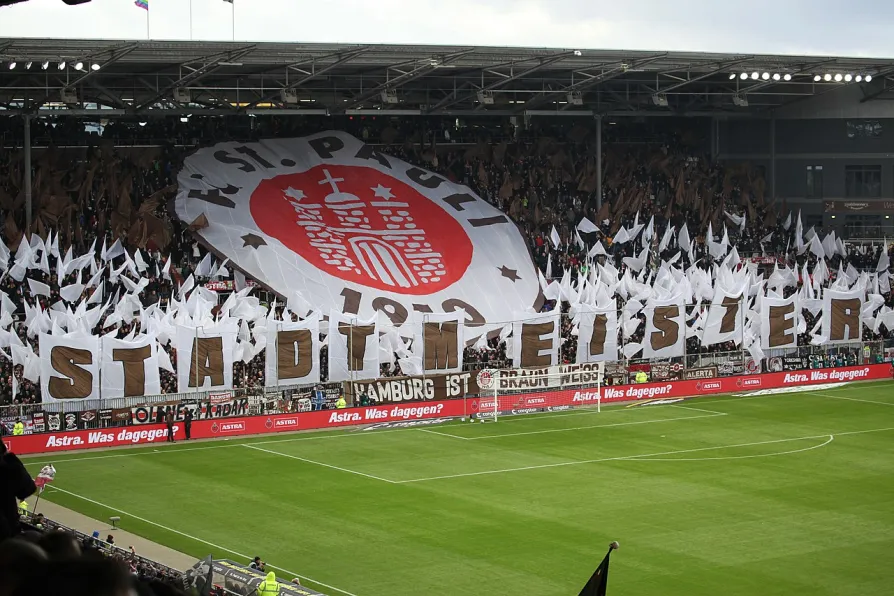JAMES NALTON on Munyua’s stinging success at the World Darts Championship

 Supporters in Millerntor-Stadion for FC St Pauli's game against Vfl Osnabrück, March 2020
[Jeuwre / Creative Commons]
Supporters in Millerntor-Stadion for FC St Pauli's game against Vfl Osnabrück, March 2020
[Jeuwre / Creative Commons]
GERMAN football fans are known for their vocal, prominent stances on social and political issues that affect minorities, oppressed peoples, and the working class.
Their solidarity with football supporters, both in their leagues and others around the world is well known.
It has contributed to global supporter unity and numerous club partnerships, rallying behind common causes that affect not just football fans, but communities outside of football too.
One club that epitomises this is the Hamburg-based club St. Pauli. Despite rarely featuring in Germany’s top division, St. Pauli can boast fan clubs with substantial numbers across the globe.
Support has been attracted to the club’s left-wing politics and stances on numerous social issues.
It is German football’s major left-wing brand, and says in its set of Guiding Principles that: “The active fan base [i.e. primarily those actively involved on matchday] are the foundation for the emotionalisation of football, which in turn constitutes the basis for the marketability of FC St. Pauli.”
The club’s principles also state that FC St. Pauli: “accepts its social responsibility and promotes the interests of its members, employees, supporters and volunteers beyond the sphere of sport.”
There is no keeping politics out of football here, and no hiding that fans help the club’s brand and marketability.
But a rift has developed between St. Pauli’s local fan groups and many of the international St Pauli supporters groups on the issue of how to show support for Palestine and Palestinians.
Some of the strong, unabashed support for Palestinians from St. Pauli’s international groups on the back of Israel’s latest and most intense assault on the Gaza Strip, has been met with caution, in some cases approaching condemnation, by St. Pauli’s local fans, or “active fan base” as they are referred to above.
A sign was posted on social media showing St. Pauli fans at a game holding a banner reading: “From Gaza to Glasgow, fight anti-semitism! Free Palestine from Hamas!”
It was a thinly veiled reference to St. Pauli’s official supporters’ club in Glasgow. One that has been among the many international fan groups showing support for Palestinians along with criticism of the actions of the Israeli government.
Contained in a statement from numerous St. Pauli international supporters’ groups, including those from Liverpool, Chicago, Athens, as well as Glasgow, was also condemnation of Hamas following the group’s terrorist attacks in Israel on October 7.
“We condemn the religious fundamentalism, human rights abuses and indescribable brutality of the Hamas regime,” read the statement.
“We share nothing more with these people than we share with the Netanyahu regime.
“We don’t stand with Hamas, we actually despise them. Hamas is simply the sad result of the policies enforced in the Palestinian land.
“We stand with the Palestinian people, the ones being bombed again with phosphorus bombs.”
Meanwhile, St. Pauli’s “active fan base” is standing up for what is right but appears to be ignoring the elephant in the room — the ongoing imperialist oppression of Palestinians by the right-wing Israeli government and its backers in the US and Britain.
They are also, unfairly, taking digs at an international supporters’ group with very public messages that could be seen as associating that group, falsely, with anti-semitism.
The fight against anti-semitism is at the forefront of St. Pauli’s stance. The club and some supporters, partly via strong links with the left-wing Israeli club, Hapoel Tel Aviv, will likely have personal ties with those suffering in Israel following the October 7 Hamas terrorist attacks.
The international groups support this stance on antisemitism but are also right to stand openly in solidarity with Palestinians and be critical of the Israeli government as it carries out this latest atrocity.
It is surprising to see such a pushback on this from some local St. Pauli fan groups given their record of standing with oppressed peoples, and their use of similar anti-semitism smears used by the right-wing media to vilify any support for Palestine.
Meanwhile, St. Pauli’s official account on X, formerly Twitter, released a statement on October 24.

JAMES NALTON writes on the bizarre Aston Villa v Maccabi Tel Aviv scandal

Barely 100 trucks enter as bombs kill another 60












